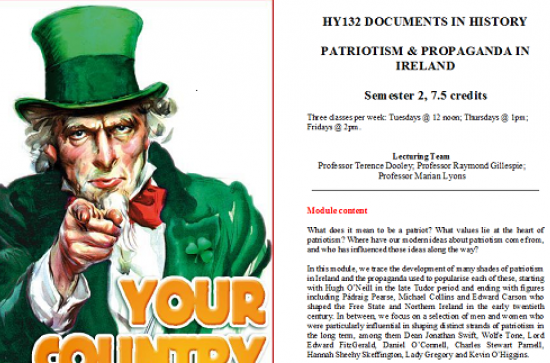
First-Year History: A Summary
The First-Year History curriculum is designed to achieve many ends: to allow you to develop as a University student; to introduce you to History as an academic discipline (as opposed to a school subject); and to allow you to sample a wide range of the approaches and interests which motivate the Department of History’s lecturers.
You can take 15, 22.5 or 30 credits of History in First Year. There are two core (obligatory) modules, one in each semester. These are:
HY 121 Introduction to Medieval History (Dr Michael Potterton)
HY 122 Making the Modern World: Themes in History (Dr Jonathan Wright)
These two modules are worth 7.5 credits each, and consist of two weekly lectures and a tutorial – a practical session which focuses on the acquisition of practical skills you will need both as a university student and a historian. Both modules involve a mix of continuous assessment (written assignments and essays) and an examination.
HY 121, as the name suggests, will introduce you to medieval Europe, with a specific focus on Ireland and the interplay between Irish, Vikings and Normans. The choice of the medieval period in your first semester in University is a deliberate one. The module is designed to allow you to approach the academic discipline of History – as distinct from the school subject of the same name – on completely new ground.
HY 122, in the Second Semester, will examine the concept of Empire from the ‘discovery’ of America in 1492 to the return of Hong Kong to China in 1997. This broad-ranging module provides an opportunity to explore the ways in which the rise and fall of the European empires has helped to shape the world we inhabit today. Looking beyond national boundaries, the module will encourage you to think globally about history and to appreciate the deep historical roots of the global interconnections considered as characteristic of the modern world.
In addition, the Department highly recommends that you take two further modules, one in each Semester. These are
HY131 The Practice of History
(Dr Alison Fitzgerald; Prof. Filipe Ribeiro de Meneses; Dr Lili Zách)
HY132 Documents in History
(Prof. Terence Dooley; Prof. Raymond Gillespie; Prof. Marian Lyons).
In these modules – again worth 7.5 credits each – you will be introduced to different historical approaches (how historians view the past and what questions historians ask about it) and the sources historians use to reconstruct the past. These modules will allow you as well to meet and work with a large number of our lecturers. Each module is divided into three separate strands, each under the responsibility of an individual lecturer. They are assessed by a combination of essays, in-class tests and exams.
In HY 131, Dr Fitzgerald’s strand, History and its Images: Art as Historical Evidence, considers how physical artworks were and are used to manufacture identities, disseminate propaganda, destroy reputations and eulogise or discredit political regimes. Prof. Ribeiro de Meneses’ strand, entitled Fascist Lives: Biography, Autobiography, Hagiography, examines how Mussolini, Hitler and Franco used autobiographical writings to create an image of themselves, and how this image was then replicated in their respective regime’s propaganda machine – and, sometimes, by professional historians. Finally, Dr Zách’s strand, The Politics of Humour in the Twentieth Century, explores how humour and laughter functioned as a means of dissent and a political weapon in Ireland and Europe over the course of the past century.
In HY132, subordinated to the theme Patriotism and Propaganda in Ireland, the emphasis is placed squarely on the idea of Irish patriotism, the development of which is traced from the late Tudor period to the 20th Century. A documents-based course, it considers a wide range of sources generated by men and women who were particularly influential in shaping different strands of Irish patriotism – and asks you to engage with these documents, honing your skills in locating and interpreting sources, contextualising primary documents, reconciling conflicting claims in various sources and evaluating the reliability of evidence.
If you have any questions about the curriculum please email history.department@mu.ie
I look forward to seeing you in our classrooms!
Filipe Ribeiro de Meneses
Professor & Head of Department
